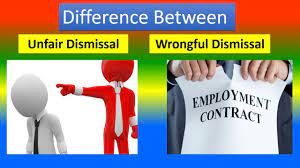Losing your job unexpectedly can be a traumatic event, especially if you feel you have been wrongly treated. This may involve unfair or constructive dismissal, so what is the difference between these two employment law terms?

Unfair dismissal cases
First, let us take a look at how unfair dismissal is defined. You may have been unfairly dismissed if your employer has no good reason for terminating your employment or does not follow the company’s own formal dismissal or disciplinary procedure.
The list of circumstances in which an employee can be deemed to be unfairly dismissed has grown in recent years to include activities such as exposing wrongdoing in the company, known as whistleblowing. It includes situations where an employee has sought to enforce their right to working tax credits, taken part in industrial action lasting less than 12 weeks or joined a trade union.
There are many other examples, such as when maternity leave properly applied for is the cause for dismissal or where time off is needed for jury duty, together with a variety of other situations in which employment has been terminated.
Constructive dismissal cases
Constructive dismissal is deemed to have taken place when you are forced to leave your employment against your will as a result of the conduct of your employer. This can occur where you are not paid or demoted from your position for no reason.
You must have a serious reason for quitting, such as being asked to make unreasonable changes to your work conditions or where your employer has allowed you to be bullied or harassed at work. The employer’s breach of your contract may be one serious event or a number of incidents over a period of time.
You should always try to resolve the issues with your employer before making a constructive dismissal claim. If, however, you feel you can make a case for constructive dismissal, you should leave your employment at the earliest opportunity since your employer may claim that by continuing in the job, you accepted any work changes or behaviour within the company.
A settlement agreement is sometimes used to end an employment relationship in a way the employer and employee both deem acceptable. If you sign a settlement agreement, you cannot make a constructive dismissal claim to an employment tribunal.
You will find plenty of information on employment disputes online at sites such as Employment Law Friend constructive dismissal claim cases are amongst the issues covered.
ACAS and employment tribunals
It is also important to understand the workings of the Advisory, Conciliation and Arbitration Service (ACAS) which works with employees and employers to improve relationships within the workplace.

ACAS advises that if an employee thinks their dismissal was unfair or they are a victim of constructive dismissal, they should use their employer’s appeal process. Your employer should explain to you how to appeal. The existence of an appeal process is part of the ACAS Code of Conduct. They also recommend employees speak with a trade union or take legal advice as suggested above.
If you are unable to resolve the issue between yourself and your employer, you can go to an employment tribunal. There is a qualifying period to claim unfair dismissal or constructive dismissal. Since April 2012, this has been two years employment.





